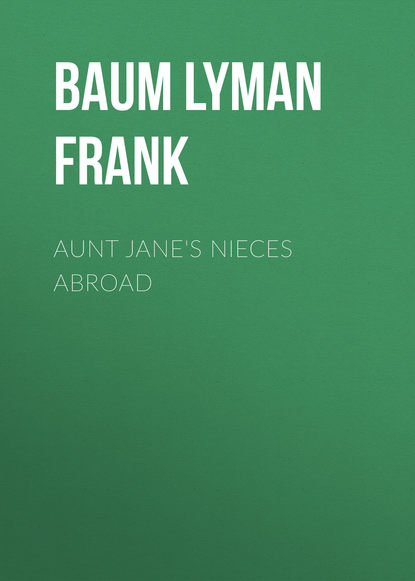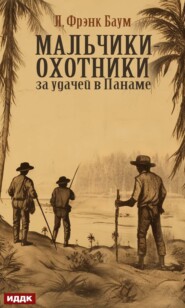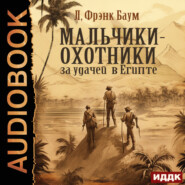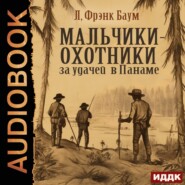По всем вопросам обращайтесь на: info@litportal.ru
(©) 2003-2024.
✖
Aunt Jane's Nieces Abroad
Настройки чтения
Размер шрифта
Высота строк
Поля
"It is certainly bad enough," observed Louise, pouting as she marked the destruction of her pretty cloak by the grimy deposit that was fast changing its color and texture.
"Well, let us get under shelter as soon as possible," said Uncle John.
The outlines of a carriage were visible a short distance away. He walked up to the driver and said:
"We want to go to a hotel."
The man paid no attention.
"Ask him how much he charges, Uncle. You know you mustn't take a cab in Naples without bargaining."
"Why not?"
"The driver will swindle you."
"I'll risk that," he answered. "Just now we're lucky if we get a carriage at all." He reached up and prodded the jehu in the ribs with his cane. "How much to the Hotel Vesuvius?" he demanded, loudly.
The man woke up and flourished his whip, at the same time bursting into a flood of Italian.
The girls listened carefully. They had been trying to study Italian from a small book Beth had bought entitled "Italian in Three Weeks without a Master," but not a word the driver of the carriage said seemed to have occurred in the vocabulary of the book. He repeated "Vesuvio" many times, however, with scornful, angry or imploring intonations, and Louise finally said:
"He thinks you want to go to the volcano, Uncle. The hotel is the Vesuve, not the Vesuvius."
"What's the difference?"
"I don't know."
"All right; you girls just hop in, and leave the rest to me."
He tumbled them all into the vehicle, bag and baggage, and then said sternly to the driver:
"Ho-tel Ve-suve – Ve-suve – ho-tel Ve-suve! Drive there darned quick, or I'll break your confounded neck."
The carriage started. It plowed its way jerkily through the dust-laden streets and finally stopped at an imposing looking structure. The day was growing darker, and an electric lamp burned before the entrance. But no one came out to receive them.
Uncle John climbed out and read the sign. "Hotel du Vesuve." It was the establishment he had been advised to stop at while in Naples. He compared the sign with a card which he drew from his pocket, and knew that he had made no mistake.
Entering the spacious lobby, he found it deserted. In the office a man was hastily making a package of some books and papers and did not respond or even look up when spoken to. At the concierge's desk a big, whiskered man sat staring straight ahead of him with a look of abject terror in his eyes.
"Good morning," said Uncle John. "Fine day, isn't it?"
"Did you hear it?" whispered the concierge, as a dull boom, like that of a distant cannon, made the windows rattle in their casements.
"Of course," replied Mr. Merrick, carelessly. "Old Vesuve seems on a rampage. But never mind that now. We've just come from America, where the mountains are more polite, and we're going to stop at your hotel."
The concierge's eyes wandered from the man to the three girls who had entered and grouped themselves behind him. Then they fell upon the driver of the carriage, who burst into a torrent of vociferous but wholly unintelligible exclamations which Uncle John declared "must be an excuse – and a mighty poor one – for talking."
The whiskered man, whose cap was elaborately embroidered in gold with the words "Hotel du Vesuve," seemed to understand the driver. He sighed drearily and said to Mr. Merrick:
"You must pay him thirty lira."
"How much is that?"
"Six dollars."
"Not by a jugfull!"
"You made no bargain."
"I couldn't. He can't talk."
"He claims it is you who cannot talk."
"What!"
"And prices are advanced during these awful days. What does it matter? Your money will do you no good when we are all buried deep in ash and scoria."
The big man shuddered at this gloomy picture, and added, listlessly: "You'll have to pay."
Uncle John paid, but the driver wouldn't accept American money. The disconsolate concierge would, though. He unlocked a drawer, put the six dollars into one section and drew from another two ten-lira notes. The driver took them, bowed respectfully to the whiskered man, shot a broadside of invective Italian at the unconscious Americans, and left the hotel.
"How about rooms?" asked Uncle John.
"Take any you please," answered the concierge. "All our guests are gone but two – two mad Americans like yourselves. The servants are also gone; the chef has gone; the elevator conductors are gone. If you stay you'll have to walk up."
"Where have they all gone?" asked Uncle John, wonderingly.
"Fled, sir; fled to escape destruction. They remember Pompeii. Only Signor Floriano, the proprietor, and myself are left. We stick to the last. We are brave."
"So I see. Now, look here, my manly hero. It's possible we shall all live through it; I'll bet you a thousand to ten that we do. And then you'll be glad to realize you've pocketed a little more American money. Come out of that box and show us some rooms, and I'll help to build up your fortune."
The concierge obeyed. Even the horrors of the situation could not eliminate from his carefully trained nature that desire to accumulate which is the prime qualification of his profession. The Americans walked up one flight and found spacious rooms on the first floor, of which they immediately took possession.
"Send for our trunks," said Mr. Merrick; and the man consented to do so provided he could secure a proper vehicle.
"You will be obliged to pay high for it," he warned; "but that will not matter. To witness the destruction of our beautiful Naples is an unusual sight. It will be worth your money."
"We'll settle that in the dim hereafter," replied Uncle John. "You get the trunks, and I'll take care of the finances."
When the concierge had retired the girls began to stuff newspapers into the cracks of the windows of their sitting room, where the fine ash was sifting in and forming little drifts several inches in thickness. Also the atmosphere of the room was filled with impalpable particles of dust, which rendered breathing oppressive and unpleasant.
Uncle John watched them for a time, and his brow clouded.
"See here, girls," he exclaimed; "let's hold a council of war. Do you suppose we are in any real danger?"
They grouped around him with eager interest.
"It's something new to be in danger, and rather exciting, don't you think?" said Beth. "But perhaps we're as safe as we would be at home."

















